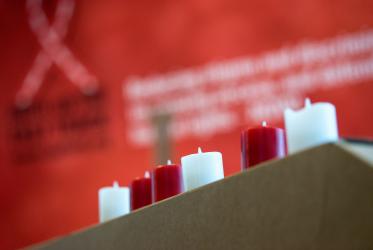By Georgina Goodwin
In Nairobi, faith leaders, children and adolescents joined efforts to mark World Children’s Day, for action together on HIV and TB.
As the World Council of Churches (WCC) marked World Children’s Day around the world this week, events in Nairobi, Kenya highlighted the urgency of addressing the needs of children living with HIV and TB, who are often forgotten in global and national HIV responses.
The WCC-Ecumenical Advocacy Alliance (WCC-EAA), the Interfaith Network of Religious Leaders Living with or Personally Affected by AIDS in Kenya (INERELA +) and the Eastern Deanery AIDS Relief Program (EDARP) organised a series of events over 19-20 November with religious leaders, government representatives and civil society aimed at mobilising faith communities to advocate for children's rights to HIV and TB testing, treatment and care.
Young people spoke movingly about their personal experiences of living with HIV and TB and several of them read out letters they had written to Kenya’s First Lady, government ministers and religious leaders calling on them to take action on issues such as stigma related to HIV and TB.
Participants also agreed a set of follow-up actions by religious leaders to address the challenges identified and ensure that all children and adolescents living with HIV and TB have access to prevention, testing and treatment.
“It’s important for religious leaders to lead by example, we are the backbone of society. We must help people and empower children in their health. If we ourselves are informed we can give them direction so that they can live a better life,” said Imam Yusuf Abuhamza of the Supreme Council of Kenya Muslims, at a workshop for more than 100 religious leaders, young people and other key actors.
A powerful demonstration of the role faith can play
Kenya has an HIV prevalence rate of 6 per cent, and thus 1.6 million people living with HIV infection. In 2017, 110,000 children in Kenya were living with HIV, making Kenya one of the six HIV “high burden” countries in Africa. Since the start of the epidemic, globally five million children aged 0-14 have died from AIDS-related illnesses, 91 per cent of them from sub-Saharan Africa, and remarkably, all of them preventable. At the same time, globally 1 million children were infected with TB in 2017, with 40,000 deaths caused by HIV/TB co-infection.
On 20 November, more than 300 young people and religious leaders marched through the streets of Nairobi displaying placards promoting the welfare of children.
Religious leaders shared reflections and prayers, saw performances and statements by young people, and voluntary HIV and TB tests were offered.
“The WCC-EAA mobilises and builds capacity among religious leaders, faith based organisations, children and youth in places of worship, and in religious schools, to advocate for government and pharmaceutical companies to scale up access to paediatric HIV and TB testing and treatment,” explains Francesca Merico, coordinator of the WCC-EAA HIV Campaign.
“These events have been a powerful demonstration of the contribution that religion can make,” concluded WCC-EAA consultant Stuart Kean.
Protecting children from any violence is essential message of Christianity, says Ecumenical Patriarch (WCC press release of 22 November 2018)
WCC to ring with children’s voices across the world (WCC press release of 16 November 2018)










